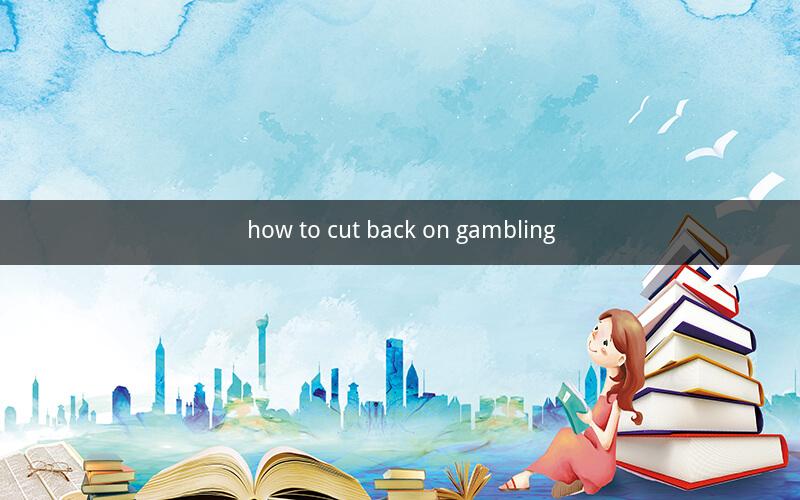
Table of Contents
1. Understanding the Problem
2. Identifying the Signs of Problem Gambling
3. The Psychological Aspects of Gambling
4. Financial Consequences of Excessive Gambling
5. Strategies for Cutting Back on Gambling
- Setting Clear Limits
- Finding Alternatives to Gambling
- Seeking Support from Others
- Professional Help and Resources
6. Building a Support System
7. The Role of Technology in Gambling
8. The Importance of Self-Reflection
9. Long-Term Recovery and Maintenance
10. Case Studies and Success Stories
1. Understanding the Problem
Gambling can be an enjoyable pastime for many, but for others, it can turn into an uncontrollable addiction. Recognizing when gambling has become a problem is the first step towards cutting back. It's essential to understand the psychological and financial consequences of excessive gambling to fully grasp the gravity of the situation.
2. Identifying the Signs of Problem Gambling
Problem gambling can manifest in various ways. Here are some common signs to look out for:
- Financial Issues: Borrowing money, missing bills, or using savings to fund gambling activities.
- Behavioral Changes: Lying about gambling habits, avoiding family and friends, or spending less time on hobbies.
- Psychological Symptoms: Feelings of guilt, anxiety, or depression, as well as increased stress levels.
- Social Consequences: Strained relationships, job loss, or legal issues due to gambling-related activities.
3. The Psychological Aspects of Gambling
Gambling triggers the release of dopamine in the brain, which can create a sense of excitement and reward. This can lead to a psychological addiction, making it difficult for individuals to control their gambling behavior.
4. Financial Consequences of Excessive Gambling
Excessive gambling can lead to significant financial problems, including debt, bankruptcy, and the loss of assets. It's crucial to address these issues to regain control over one's financial situation.
5. Strategies for Cutting Back on Gambling
Setting Clear Limits
Establishing strict limits on gambling activities is essential. This includes setting a budget, determining the amount of time spent gambling, and sticking to these boundaries.
Finding Alternatives to Gambling
Engaging in healthy activities can help reduce the urge to gamble. Consider hobbies, exercise, or joining social groups to occupy your time.
Seeking Support from Others
Support from family and friends can be invaluable. Sharing your struggles and receiving encouragement can help you stay on track.
Professional Help and Resources
Seeking professional help is an important step towards recovery. Therapists, counselors, and support groups can provide guidance and support.
Building a Support System
Creating a strong support system can help you stay motivated and focused on your goals. This may include joining a gambling anonymous group or connecting with others who have overcome similar challenges.
6. The Role of Technology in Gambling
The rise of online gambling has made it easier than ever to access gambling platforms. Understanding the risks associated with online gambling and taking steps to limit your exposure can help reduce the temptation.
7. The Importance of Self-Reflection
Regular self-reflection can help you recognize patterns in your gambling behavior and identify areas for improvement. Reflecting on your thoughts and feelings can lead to greater self-awareness and personal growth.
8. Long-Term Recovery and Maintenance
Long-term recovery requires dedication and perseverance. Developing coping mechanisms and maintaining a healthy lifestyle can help prevent relapse.
9. Case Studies and Success Stories
Hearing about the experiences of others who have overcome problem gambling can be inspiring. Case studies and success stories can provide hope and guidance.
10. Conclusion
Cutting back on gambling is a challenging but rewarding process. By understanding the problem, identifying signs of problem gambling, and implementing effective strategies, individuals can regain control over their lives and overcome this addiction.
Questions and Answers
1. Q: How can I determine if I have a gambling problem?
A: Look for signs such as financial issues, changes in behavior, and psychological symptoms.
2. Q: Are there any legal consequences of problem gambling?
A: Yes, problem gambling can lead to legal issues, such as theft or fraud, if it results in criminal behavior.
3. Q: Can I overcome a gambling addiction on my own?
A: While it's possible to make progress independently, seeking professional help and joining support groups can significantly improve your chances of recovery.
4. Q: How can I avoid relapse after overcoming a gambling addiction?
A: Develop coping mechanisms, maintain a healthy lifestyle, and continue to seek support from others.
5. Q: Is there a medication that can help treat gambling addiction?
A: Currently, there is no medication specifically designed to treat gambling addiction, but therapy and support groups can be effective.
6. Q: How can I tell if my friend is struggling with problem gambling?
A: Look for signs such as financial issues, changes in behavior, and social withdrawal.
7. Q: Can problem gambling affect my family?
A: Yes, problem gambling can have a significant impact on family members, leading to strained relationships and financial stress.
8. Q: Are there any free resources available for individuals struggling with problem gambling?
A: Yes, many organizations offer free resources, including hotlines, support groups, and online forums.
9. Q: How long does it take to overcome a gambling addiction?
A: The duration of recovery varies for each individual, but it often takes several months to years.
10. Q: Can problem gambling lead to suicidal thoughts?
A: Yes, problem gambling can contribute to feelings of hopelessness and despair, which may increase the risk of suicidal thoughts. If you or someone you know is experiencing these thoughts, please seek immediate help.